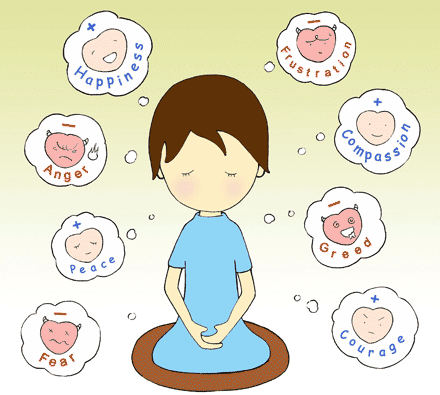Information for adults
Introduction to Anapana-Meditation
Children naturally want to discover and learn new things. Through the media and a hectic and complicated living environment their senses are nowadays often overloaded with countless impressions. We want to give children the opportunity to focus their attention on themselves in the silence of meditation and to discover their mind with all its hidden abilities and latent potentials.
Anapana meditation is a concentration and mindfulness exercise. It is a necessary preliminary practice for Vipassana meditation, which is offered only to adults, but it can also be practiced independently. The object of meditation is the natural breath. The effort here is to be aware of each breath as it comes in and flows out. Experience has shown that children as young as 8 can master this exercise with amazing ease. And they enjoy it, so many of them like to come back.
Back home children can continue to practice what they have learned in a way that suits their needs. It is reported again and again that the benefits for the children are also reflected in their behavior and attitude. Children themselves express that meditating helps them to concentrate and improve memory. Meditation provides them with a tool to help them better cope with anxiety, anger, stress, and the pressures of growing up.
General information
Courses for children and young people have been part of the regular course program of Vipassana centres all over the world for many years. Course dates can be found here.
By the way: If there is no course for you availabile, you will also find German-language Anapana courses for children and adolescents in the following countries:
- In Switzerland: sumeru.dhamma.org
- In Germany: dvara.dhamma.org
The courses start in the afternoon of the arriving day and end around lunchtime of the departure day, with either one or two full days in between. After arrival the children first of all have time to get to know each other and have some tea and cookies. In the evening there is an introductory talk in which the special prerequisites and rules for staying at the centre and for the course are pointed out. After that, all go together into the meditation hall to get the first instructions for Anapana Meditation.
The following days begin at 7 a.m. with some morning exercise or gymnastics. The guided 20-30 minutes long meditation sessions are spread over the whole day and leave enough time to play, read, do handicrafts, sports or just to relax. During the joint meditation in the hall, complete silence is kept with no talking. The day ends around 8.30 p.m.
Costs and registration
All courses in this tradition are run exclusively on a donation basis and with the support of volunteers. No participation fees are charged. For better planning and timely processing, we ask that your child registers at least 2 weeks prior to the start of the course: Course registration.
Accommodation and supervision
The children sleep segregated in shared rooms with other children of the same age. Parents who apply to give service during the course, are accommodated separately if not explicitly wished differently. They have different meditation and meal times and work as helpers in the kitchen, house or garden. In general a team of experienced helpers looks after the children.
Motivation
Please note that children should not be pressured to participate in such a course. The course is demanding despite a child-friendly social program and your child should therefore participate of its own volition.
Dhamma service for parents
If you have already taken part in a 10-day Vipassana course with assistant teachers of S.N. Goenka, you are welcome to apply for Dhamma Service during the course. In general there is lots to do in the house, garden or kitchen.
S.N. Goenka about children's courses:
"The whole technique has only one aim: to live peacefully and harmoniously in tune with the law of nature, without harming oneself and harming others. When one is old, this art of living is more difficult to learn, so it is good, if the training takes places already at a young age. Already children should learn the art of how to live a good and wholesome life. They still have their whole life before them."


